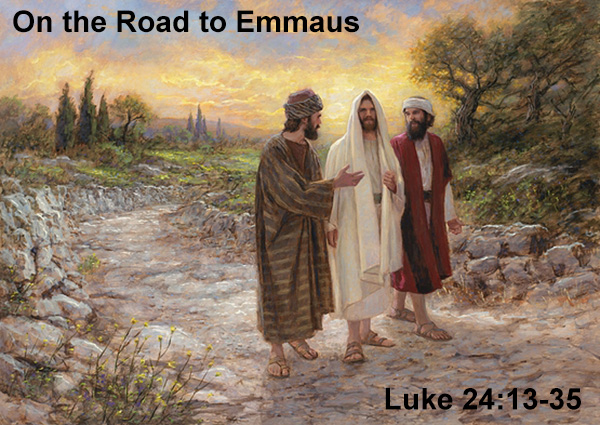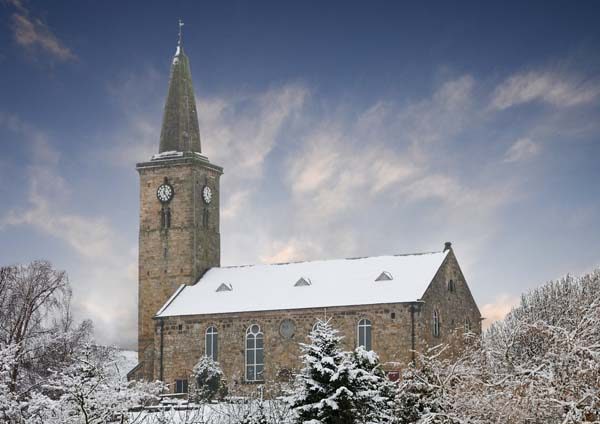Rev Alistair McLeod’s message for the Third Sunday of Easter.
The Gospel reading for today is: St Luke Chapter 24 verses 13 to 35. On the Road to Emmaus.
I was only a small boy in Cellardyke when the last World War began and I can remember a time very much different to the time we are living in now; there were no television sets then and no video games either; we depended on one another, brothers and sisters parents, aunts and uncles and cousins. We had to make our own fun and I can remember even during the war, there was a lot of laughter too. These were the days when whole families lived in the same village or town and so family contacts were easier too. Somehow even despite the war it was a simpler time. Often, we spent evenings together, playing Ludo or listening to the wireless or telling stories. These were spontaneous gatherings around the fireside or the kitchen table. My auntie Ella was a great story teller, telling stories sometimes stirring, sometimes frightening. Most of them had at least a little of the fantastic about them, but they never failed to entertain. Even as Children we learned to distinguish the noise the German Bombers engines made as they flew up the River Forth to reach the bridge and Rosyth Dock Yard – they never did; RAF Leuchars saw to that.
Only as I grew older did I come to understand that these nightly pastimes served a higher purpose than mere entertainment. In the telling and hearing of our stories, we gained a keen awareness of who we were. At the same time and very subtly, we were given some notion of what, and who, we were supposed to become.
Even those stories involving hunting and fishing, stories requiring us to suspend disbelief, carried within them something of who we were. Our elders recited our history for us in order to pass along what they had learned, from their elders and from their own experiences.
The resurrection appearance told in today’s Gospel reading is a story intended for those of us who were not in Jesus’ inner circle. This resurrection appearance involved ordinary Christians just like us. People who were part of the ministry, but who played minor roles and who were not always mentioned by name.
The two people involved in this story we know nearly nothing about.
What we do know about them is that they were disciples or students and followers of Jesus. We know that they were on their way to the town of Emmaus. We know that the subject of Jesus’ death dominated their conversation and that they were seriously grieving his loss.
As they walked along, they were joined by a stranger; nothing odd about that – on lonely country roads strangers often attached themselves to groups; safety in travel was no small matter. This stranger also involved himself in their discussion, he wanted to be included in their conversation, so he asked what they were talking about. The two astonished disciples couldn’t believe that anyone could have been in Jerusalem that past week, and yet fail to know what had happened. And they told his so.
The resurrected, but unrecognized, Jesus played along. He asked the appropriate questions and the two disciples spilled out to him the deep burden of their hearts. This was not idle conversation. These people were in pain. They told their story of Jesus as they had come to know him. They recounted the dreams they had begun to dream. Dreams that had seemed so possible because of their life with Jesus. Easily, the most poignant line in their retelling is, “We had hoped that he was the one to redeem Israel.” We had hoped.
Nothing hurts quite so much as shattered hopes. Nothing is quite so painful as a beautiful dream of something long-desired that ends suddenly and can never happen. There is nothing worse than the bitter taste of a stark reality that a dying dream leaves behind. These people were suffering from just such a loss.
In response to their distress, Jesus told them a story. In fact, he told them a great many stories. Before he was done, Jesus had reviewed for them the scriptural foundation on which their hope for a Messiah had been built. None of the stories were new to these disciples. They had heard them since they were old enough to hear- but they didn’t fully hear them. They heard them, but they did not recognize the power behind the words. Because they did not hear fully, the stranger who was talking with them remained a stranger. Indeed, he remained a stranger to them until they sat down for the evening meal.
At the table, even though the stranger was the invited guest, he took the role of host. He took the bread and said the blessing. We are not certain what words Jesus used to bless the bread, but we believe the disciples heard, “This is my Body which is given for you.” It was in that moment, the moment of the blessing of the bread, the moment of the blessing that changed the very meaning of bread forever, that mere hearing was replaced with recognition. Then the disciples realized that they had been in the presence of their Risen Lord through most of that long afternoon.
We are told they had reached their destination for the day and that darkness had fallen. We know that travel at night was a dangerous undertaking in that place and time. We also know that those two disciples abandoned their evening meal and the safety of their lodging and lost no time in returning to Jerusalem. The indications are that they ran to Jerusalem. They ran because they had news that was too good to wait. Never mind the danger. The Lord is risen, and the rest of the community needs to hear about it.
This resurrection story is for all of us. It gives us a clear signal that the Risen Lord is with us. It also gives us a clue to the sort of response we ought to make.
We meet the Risen Lord in the breaking of the bread and we meet the Risen Lord in his Body, the Church. The sacraments of the broken bread and the Church as the Body of Christ are windows through which we may glimpse the Divine. The power of these sacraments lies at the heart of who we are as the Body of Christ, the Church.
My friends keep safe, take care of one another, knowing that you are loved and richly blessed. Amen
A Prayer.
Lord Jesus Christ, you call each one of us to be your witnesses – to tell others of what we have experienced of your love, to make known what you have done for us.
Help us to do that faithfully, to play our part in your kingdom and your purpose. And so, through us may others meet you and know you for themselves.
You have given us the Good News;
Help us to share it to your glory.
Amen

